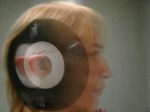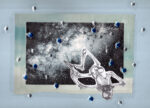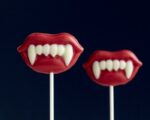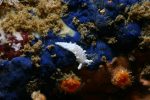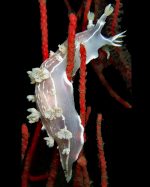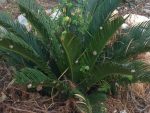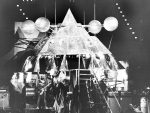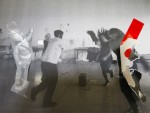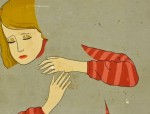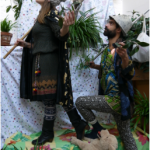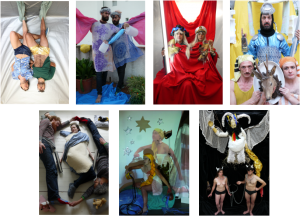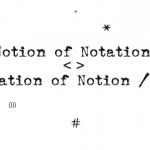"We are all very familiar with oppressive education; with its systems of reward and punishment, the stimulus of competition, the naming of the strong and the weak, the encouragement of reproduction by repetition, the reinforcement of norms and normativity, the unquestionability of the accommodating attitude towards the status quo, and its decision-making-educators—who by refusing dialogue—do not organise the people. The very goal of oppressive education isn’t to liberate nor to be liberated but to manipulate, control and generate conformism.
However, there is another sort of education that is precisely based on dialogue; a form of education that doesn’t function as a tool to facilitate anyone’s integration into the logic of the present system. It is the practice of freedom in its most germinating terms; the facilitation of critical thinking, creativity and citizenry.
a.pass is one of such places, of permanent learning and of promotion of such form of education. I was privileged to have been a part of this program and to have developed there much of my understanding of artistic research and art.
I sincerely hope this institution is granted the opportunity to keep on existing and help shape the artistic scene I am a part of."
Luanda Casella. Schrijver en theatermaker. Artist in residence NTGent
*
“I arrived at a.pass in the crucial moment of my life and career while searching for a way to combine various interdisciplinary artistic and academic experiences and, thus, to define my research and practice. There, I found a unique environment - rigorous intellectual discourse, dedicated peers and mentors, supportive community, and freedom to work on what I needed at that time. Even though previously engaged in international scenes of visual arts, performance and social sciences, I did not know such a place could exist. Until now I do not know another institution comparable to a.pass, neither in Belgium nor internationally. A.pass was the context where I developed the professional trajectory that I now follow. After and thanks to the post-graduate program of a.pass, I started a PhD in artistic research at Hasselt University (fully funded), published two books, and created performances, films and installations in collaboration with such institutions as Whitechapel Gallery, Delfina Foundation and Arts Catalyst in London, Venice Biennial for Architecture in Venice, Kunsthal Gent, BOZAR Brussels, Konstepidem in Gothenburg, among others. In these projects I often collaborate with artists and researchers whom I encountered through the context of a.pass. I firmly believe the relevance of this institute to be invaluable for the fields of contemporary art, performance and artistic research, as well as its model as an institutional structure to be unique and experimental.”
Goda Palekaite. Artist researcher. Ph.D. candidate at Hasselt University and PXL-MAD School of Arts.
*
“Een jaar op a.pass heeft me meer gegeven dan drie jaar reguliere kunstopleiding. Voordat ik naar a.pass ging dacht ik niet dat het mogelijk is: les krijgen van échte kunstenaars. In vergelijking met a.pass waren mijn jaren op theaterschool een omweg vol met vast benoemde docenten die te ver van de kunstwereld verwijderd waren. Juist doordat a.pass een uniek, steeds veranderende en hybride school is die niet onder één noemer te vatten is, slaagt de opleiding er beter in om in te spelen op de veranderende wereld. Participatie is er geen loos woord: participanten en docenten kunnen de vorm van de opleiding permanent bevragen en verscherpen. a.pass uit België halen betekent een enorme en onmiddellijke verschraling van ons kunstenveld.”
Jozef Wouters. Scenograaf en theatermaker. Winnaar Ultima Podiumkunsten 2019 met Decoratelier
*
"As Brussel's only learning environment focused on artistic research and performance, a.pass serves a unique and irreplaceable function in the city. My work has been transformed by the intensive learning experience I've had there. It's more than just an institution, it's an international community coalesced around principals of rigor, collaboration and care. It gave me the confidence to emphasize knowledge production and performativity as the core strategies in my own art teaching practice."
Gary Farrelly. Beeldend kunstenaar, performer en pedagoog bij La Cambre.
*
"As a past researcher at a.pass I would like to express my disdain and concern over the decision of the Ministry of Education to withdraw their support from the insitution. My time at a.pass has been a period of incredible growth as artist, researcher and in my apprach to pedagogy in the arts. The research I started there have since resulted in projects & research supported locally, nationally, internationally by funders as well as prestigious institutions in Belgium and abroad and continues to fuel my practice and thinking. I strongly believe that a.pass is a unique institution in Europe for the quality & rigour in their pedagogical approach and vocabulary of methodologies that represent an incalculable cultural value in its own right. Beyond this collective value a.pass is also a rich and diverse environement for individual artistic researches to flourish that not only allowed me access to an incredible breadth of thinking and practices, establish new collaborations but also continues and will continue to feed my research and practice multiplying manifold the investment of the ministry and adding values be they academic, cultural, financial, artistic, emotional to Belgian academia, the Belgian state and its people. As a resident of Brussels, as an artist, as independent researcher, as an alumni of a.pass and as a European citizen I call on the Ministry to reverse their decision."
Eszter Nemethi, artist, curator
*
"I was a participant in a.pass in 2014 and it was an adrenaline injection into my practice. Vague ideas transformed into solid ground for a collaborative performative practice and it was a strong and formative influence also on my work as a teacher. Besides being an invaluable place of research and education, a.pass offers it's alumni a professional community that uniquely reinforces their work and careers. In this way it is a strong, constitutive player in the whole Belgian (performance) art field."
Philippine Hoegen, artist, educator
*
“Als internationaal kunstenfestival met een sterke interesse voor artistieke pedagogie zijn we bijzonder bedroefd over het nieuws dat a.pass zijn werkingsmiddelen zal verliezen. Het ondoordacht en lichtzinnig schrappen van een artistieke onderzoeksinstelling als a.pass is een totale verarming van het kunstschoollandschap. Als we de toekomst van het Vlaamse kunstenveld willen bestendigen dan moet er blijvend geïnvesteerd worden in verschillende vormen van artistiek onderwijs. a.pass is daar voor ons een cruciaal en onvervangbaar onderdeel van.”
Dries Douibi, artistiek directeur KUNSTENFESTIVALDESARTS
*
“Elk hedendaags artistiek ecosysteem heeft behoefte aan infrastructuur voor artistiek onderzoek. Sinds 20 jaar heeft Vlaanderen dit stapsgewijs verankerd in de grote academische onderwijskoepels. Sinds 14 jaar bestaat er een onafhankelijk, klein instituut, a.pass, wat fungeert als een internationaal laboratorium voor individueel onderzoek in een omgeving die zelforganisatie en solidariteit cultiveert. A.pass is daarenboven een unieke reflectiekamer over de methodieken en de ethiek van onderzoek. A.pass is een voorland, een stukje van dat ecosysteem dat bewezen heeft bijzonder goed in staat te zijn om het artistiek én het academisch veld te irrigeren met onvermoede voedingsstoffen. Zonder a.pass zou het programma van een huis als Kaaitheater verschralen.”
Barbara Van Lindt, algemeen en artistiek coördinator KAAITHEATER
*
"This is striking and sad news: the Flemish government stops the support for a.pass artistic research school, and also for HISK/Hoger Instituut voor Schone Kunsten/Higher Institute for Fine Arts. At the same time they decided to continue and increase the support for two other educational institutions: the International Opera Academy and the Orpheus Institute. Both institutions are focussed on western classical and contemporary forms of music.
The political choice is clear, and is probably exemplary for the direction the Flemish arts scene is evolving to the next years: real experiment, more dissident or difficult developments of artistic practices are cancelled in favour of frictionless, bourgeois ways of relating to art. I am not calling out opera and music research, don’t misunderstand me here, my plea is to support different educational views on art and access to different ways of relating to art. This government has decided to slowly but surely cancel out a vivid and (politically) more critical part of the arts scene. Yes, we knew this already, now we see it in action."
Michiel Vandevelde, artist, dancer
*
“Als commissie schreven we een inhoudelijk advies dat a.pass met een goed tot zeer goed rapport richting een toekomst loodst, waarbij een stopzetting van subsidiëring nooit ter sprake is gekomen en voor ons nooit op de agenda stond. In dit rapport beschrijven we op een constructieve en positieve manier hoe a.pass functioneert. Dit rapport kwam tot stand na het doornemen van hun benchmarking, analyse van de voorbije jaren, plannen voor de toekomst en inspirerende gesprekken met (ex-)studenten, mentoren, management, bestuur en collega’s uit het veld. We zijn dan ook verbaasd en teleurgesteld dat de minister dit gunstige advies naast zich neer heeft gelegd.”
An Vandermeulen & Mira Sanders (evaluatiecommissie)
*
“It is with shock and sadness that we receive the news that Minister Weyts of Education will not prolong the agreement with HISK and a.pass starting 2024. The reason given for this decision is the lack of added value to the ecosystem of educational art institutes in Flanders. As director of the Jan van Eyck Academie in Maastricht I can only say that this is far from the truth and this decision will be a blow to the network of post academic institutes in Europe. HISK and a.pass are part of the postacademic ecosystem and fill in just as all the other post academic institutes the gap between educational/academic and artistic practice. This is the reason why so many international artists find their way to Belgium, The Netherlands and Germany. There are no such institutes available in the world. Northern Europe has played a significant and leading role in nurturing and sustaining institutes like these for over 150 years starting with the Rijksacademy in Amsterdam. Also, postacademies push the narrative and discourse of artistic and artistic research practice internationally. This will be a blow to both fellow institutes and artists alike. I hope sincerely that Minister Weyts will reconsider his decision and will allow HISK and a.pass play the important role that they have been doing for so many years.”
Hicham Khalidi - directeur Jan Van Eyck Academie
*
"a·pass has been coming to PAF every year as part of its research curriculum. The dedication towards experimental forms of education, practices of collective organization and the politicization of artistic research, makes it an invaluable institution in the landscape of school and educational programmes.”
Simon Asencio, performing artist and pedagog. On the behalf of PAF - Performing Arts Forum - Saint-Erme, France
*
"What I found in a.pass is the art school I imagined to be part of when I first thought of becoming an artist. It just took me 10 years to get there. My art education begins at the Faculty of Fine Arts of Montenegro, through exchange programs in art schools in Vienna and Metz, Master's degree in Luca School of Art Brussels, postmasters in St Lucas in Antwerp, to having a research position at the Royal Academy of Fine Arts in Antwerp. I can say with certainty that only after a.pass I gained the tools and confidence to be the artist I want to be. This is due to the experimental structure of a.pass that makes it a special place (and that transcends the borders of Belgium) - a well thought structure that allows a nonvertical approach to teaching, an open and transparent process that encourages all the participants to devote themselves not only to develop their own work but to do so by taking part in each other's practices, while they are co-making the institution they are part of. I think that to manage this way of working and to become this kind of institution it takes years of hard work and risk-taking, where governmental support is of crucial importance.
Also, a.pass managed to create a truly transdisciplinary environment, focussing on the performativity of artistic research and the methods of sharing knowledge. This I experienced only as an aim of artistic research programs developing today in Schools of Art. Needless to say that visual art schools are far from this achievement as they are becoming more of incubators for only specific kind of artist and art production, falling under pressure and influence of art market demands. a.pass is not just a program to go though, a step in the career, but it is an artist-run educational platform that for sure wouldn't be able to develop as such if merged within bigger structures of the School of Art.
a.pass is for me not only a program I took part in, but it is also a base experience for a belief that things can be done differently and that this world can become a less hostile place through artistic means."
Adrijana Gvozdenović, artist
*
"It’s very sad for me to read that the subsidy for a.pass will not continue. In January of 2012 I joined a.pass as a researcher. The time I spend at a.pass was extremely beneficial; a.pass widened my understanding of artistic research, pushed me to better explain my practice, and gave me the courage to articulate and share my research. I’m very grateful for that time and the connections made there. In a complex world we need more places like a.pass not less."
Elizabeth Ward, choreographer, performer, dancer
*
"I attended a.pass in 2017 and 2018, and graduated in February 2019. Without a.pass I simply don't think I would be where I am today as an artist. I learned a lot from the teachers and peers in my program. The context of a.pass (including ongoing feedback, presentation moments, space, time, research trips, budget and one-on-one mentoring support) permitted me to try new things and test out new and experimental formats, within a supportive and critical environment. a.pass provided a crucial developing ground for me to better understand my artistic practice, research methodology and needs. a.pass encourages its participants to connect with other practitioners and institutions in Belgium, and this is a strong aspect of the learning offered. The presentation of my graduation piece was held at Hectolitre, Brussels, and was organised collaboratively with two peers from my cohort. The collaboration was an important part of what made that event so meaningful. We were supported to make an audio publication together, and conceive a coherent program for our three practices, creating something none of us could have managed alone. Held on two evenings, there was a large public present to experience our event, and the three jury members subsequent feedback was invaluable. This marked a significant moment for me. Since graduating, I have continued my artistic research and consistently been invited to present performances and publish writing in Belgium and abroad. The dedicated and ongoing feedback I received during the period of my study at a.pass was instrumental to the evolution of my artistic research. The community of a.pass students and alumni is strong and ever-growing; it is a diverse group of people whose coming together makes for a unique study program, not only in Belgium but internationally. The close and unpredictable encounters with artist researchers from different disciplines and backgrounds is rare and must be valued highly. a.pass creates a veritable surplus for the artistic, cultural and educational sphere in Belgium."
Eleanor Ivory Weber, Brussels-based artist, a.pass Post-Master graduate
*
"This decision is a proof of incompetence by the Ministry when it comes to understanding the information and documentation they demand and are provided with. It is evident that those in power have horrifying little to no knowledge about their own cultural fields."
Heike Langsdorf - radical_hope - a.pass alumna, artist and pedagog in KASK
*
"Minister Ben Weyts should understand the importance of a.pass for the richly networked ecology of the Belgian art field, where bigger and smaller institutions constantly nourish each other. I experienced the value of the a.pass program from close by in 2016-17. The careful pedagogy helped me to start developing my own artistic practice, next to working as a dramaturge for other artists, amongst which some a.pass alumni such as Heike Langsdorf, Luanda Casella and Jozef Wouters."
Sébastien Hendrickx, performing artist, dramaturge, art critic
*
"I would like to testify to the great importance of the a.pass post-master program in the development of my artistic research and its outreach in Europe since 2016. It is now supporting other artistic researches in dance, performance and documentation through publications like "Mind the dance" a digital publication of REFLEX Europe, 3 years EU-project (2018), Body in Revolt, ICK Amsterdam Online Magazine (2017) and presented in renown European dance festivals and Arts institutions a.o: Charleroi Dance, Brussels (2021); Royal Conservatory of Antwerp-master program (2020 -2021) Independent Dance, London (2019); Kaaïstudio, Brussels (2018), ImpulzTanz, Vienna (2018; 2017; 2016); KASK school of Arts, Gent (2021-2018)."
Anouk Llaurens, dancer, artist, researcher in dance and pedagogue
*
"Participating in the a.pass past-master program has been hugely important for my practice. It is one of the best environments I can imagine for an artist of maker to develop and improve their critical thinking. Especially the exchange between the different fields within the arts is very special and contributes in making anyone a better and more complete artist. At least that counts for me, since my end presentation in September 2019, I've become a curator, fund raiser and a teacher and a much more complete artist. I am slowly finding my position with the international art scene and art market and turned my practice into a much more sustainable enterprise."
Maurice Meewisse, artist, curator
*
"Since 2015 a.pass offers me a unique pedagogical method and an international platform that provides the guidance of highly qualified professionals in the arts, culture, theory and sciences. Based on self organization, transdisciplinary peer exchange and multicultural community care, I find the freedom and trust to experiment with my creative, intellectual and production interests in a safe space. This has allowed me to find my research methodologies, strengthen my art practice and work, develop publishing, teaching, mentoring and curating capacities. In other words, to position my profession and be someone constructive in society."
Isabel Burr Raty, artist
*
"I have been an associate researcher at a.pass in 2018/19 and this period of time had such an influence on my practice and on my desires in regards to where I want my work to go, and whereto I want to develop as an artist and as a human being. I had the feeling already that there is something very unique and something very special happening at a.pass when I partly joined one of their blocks as a visitors, a block that was topic-wise very much connected to my practice. And this vague feeling proved so to be so true. It is hard to put this in words. As a visual artist and artist researcher I seem to have a difficult, challenging etc relationship with language. I experienced a.pass a a ‚fermenting‘ place, as a very fertile ground for other kinds of thinking, making, doing to emerge, to imagine other kinds of futures so desperately needed. One major trajectory in this is collaboration and community. ‚We are not all and the same but we are in this together‘. Coming from an art education that mostly teaches very individualistic approaches to art practices, it was so revealing to experience a.pass and their collaborative teaching and learning methods in the making. Last year I had the honour to curate a block as well together with my research cycle I fellows, and I again the experiences I made, the conversations we had, the things we had done together with the people at a.pass and the participants is now very much influencing how I want to approach working, thinking, doing in my practice based PhD, which is mainly collaborative. I have quite a hard journey in front of me. Learning how to truly collaborate and work together is not easily done when one went through all the individualised art and other higher educations. But a.pass gave me the hope and the energy and the passion and the joy to really trying it, to seeing not onl the benefits but the needs to do so. Loosing a.pass as a psotmaster education institution will create such a loss and leave such a hole within the educational field of artistic knowledge making etc., and I dread to think of the consequences this will entail. Within the spirit of a.pass I still hope, however, that we will be able to change the course and continue supporting this amazing, ideosyncratic and so needed institution."
Antye Guenther, visual artist
*
"I participated to the a.pass post-master program between October 2018 and January 2020. My experience in the frame of this institution has been that of an extraordinary exposure to critical thought and radical imagination. Not only in the context of a.pass I found a context to get in touch with the cutting edge of artistic research within an heterogeneous, international and rich group of peers and tutors, but I found also that the ever-changing and ever-challenging environment of the program regarded also the organization of the program itself. I have never met or heard, before or after my stay in a.pass, such a radical self-critical approach within an established art education institution: the program itself was a wider research project of which the participants were part of, getting influenced by it but also shaping it with their collective and individual presence. I believe that this specific fluid and self-critical approach points at the roots of what is at stake in the practice of artistic research and should be a precious model to think of its institutionalization in the context of art education - the presence of which constitutes undoubtedly a priceless treasure for Brussels cultural scene. The a.pass post-master program led me to re-imagine education, community and artistic practice as mismatched from what is already existing, to suspend given knowledge to foster the imagination of new possible realities, which I believe to be the very core of the role of "school" as an institution within our society."
Piero Ramella, visual artist and performer
*
"Small is Beautiful.
I joined a.pass in 2014, not knowing how much it would influence my practice, and how much of a large and extended family such a small organisation would connect me to. On a personal and artistic level, and through their subtly inquisitive, and insistently open approach to pedagogy, I was able to develop the courage to explore ways of presenting my work, and this is the reason I am where I am today. What I learned from people at a.pass, I keep very close to me.
We don’t only need traditional art academies, or the big names to which art schools are attached. These places may not be open to risk, but at a.pass, every problem is an opportunity to evaluate and reconsider the pedagogical framework that enables learning in ways that are present; present in the community, in the garden, in the city, in the performance space, etc. There is a clear commitment to community and sharing, in negotiating the decisions of how to learn together, and in publishing this information for others to learn from it.
While these may not be the most sought-after terms of engagement for politicians and economists, they are the terms of everyday life in any community. a.pass gives people tools for collective working, thinking, living, and making. We need these tools to re-think our relationships to the worlds we inhabit, worlds that are under threat because of the individualistic and money-driven attitudes that dominated our lives for too long.
a.pass is not just in Belgium, it is in Spain, in Romania, in Turkey, in Sweden, in Palestine, in Germany it is in Jordan, in Iran, in Serbia, in Canada, in Brazil, in Holland, in France, in Poland, in Italy, in Mexico, in the USA, in Portugal, in Ruwanda, and Iceland—to name just a few. a.pass is what puts Belgium on the international art map. Decisions to cut it out of the picture should be in consultation with the people who thrive from it, not for the furthest person from its realities. We want a more collective approach to political decisions."
Samah Hijawi, artist and phd researcher
*
"In my experience, the unique added value of a.pass is unquestionable.
Personally, a.pass has had an instrumental function in my artistic career, giving space and time to develop my artistic practice and the opportunity to make connections with colleagues and professionals in my field. The artistic developments I achieved during my time at a.pass became the pillars of my artistic practice. The works I made during a.pass allowed me to leap my practice further into unknown places. The personal connections I made in a.pass are still very important to me personally and professionally. Since being at a.pass, I started teaching at Luca School of Arts in Brussels where I am also a PhD candidate, and I participated in several exhibitions and events in the Flemish art scene.
Finally, a.pass is a pilar in its field, gathering artists from different disciplines into a truly unique institution. The artists that are formed in this institution are fresh, original, special artists, that together generate an artistic scene which is extremely valuable to the Flemish art scene as a whole.
To cut funding from a.pass is to cut out the core of a vivid and diverse art community."
Sofia Caesar, visual artist
*
“As one of the invited international peers involved in the benchmarking process initiated by a.pass in 2019, I want to express my support to a.pass and protest in the situation where the Ministry of Education has decided to cut the funding of a.pass. I am shocked to hear that the Ministry of Education uses “negative advice” coming from peers as an argument. If this refers to the benchmarking process I was involved in, it is clearly a grave misinterpretation.
In my view, the operational and pedagogical foundation of a.pass that involves dynamic intertwining of self-organisation and collaboration for both the postgraduate and the research centre programs has proven highly relevant and successful. After a long phase of institutional legitimation struggles the international field of artistic research is actively looking for new forms of organisation and ways of engaging with the professional art field beyond the university system. In this situation, a.pass appears as a significant forerunner and should be seen as one of the cutting edge institutions in the field.
Cutting the a.pass funding appears to me very short-sighted. I hope the decisions concerning this can still be reconsidered.”
Mika Elo, Professor of Artistic Research, Academy of Fine Arts / University of the Arts Helsinki Finland
*
"It would be an immense loss to the landscape of art education if a.pass would close its doors!! For me, the time I spent at a.pass was very important, it introduced me to new perspectives on art making and artistic research. a.pass gave me constructive tools to understand and articulate my practice, in a supportive and challenging manner. I most appreciate the way we have learned with and from each other on equal terms, through our own and shared desires and concerns. I have been nourished with stirring moments, insights and questions which are still unfolding. I experienced it as a place open to experimenting, failing, falling, suffering, laughing, exploding, resting, resisting, doubting, and emancipating. places with this kind of freedom are of highest value to the art world. Don’t want to have missed my time there – especially with all the wonderful and inspiring people that I know thanks to this place – it is an essential ground to the work i’m doing now."
Agnes Schneidewind, artist
*
"I was privileged to be one of a.pass's first participants, witnessing the growth and impact that a.pass has had in the artistic community over the years of its existence; an impact that has proven to have national and international reach. I have continued to be present as a mentor, curator and research associate because a.pass has become a catalyst for dedicated, open and inspiring people. For most, a year at a.pass has been a career and a personal turning point. It has given me the opportunity to carve out a personal way of doing research and producing work, a chance to bring theory and practice together that my previous master's degree, a year of research at University and a year at Fine Arts Academy did not grant me. At a.pass, I met peers with whom I continue to work and discuss, people who over the years remain intellectual and personal references, weaving a network of relationships in which Brussels functions as a focal point.
a.pass is an institution that keeps the dialogue between old and new alumni open, that is not afraid to rethink itself, that is not blind to systemic power dynamics and oppressive habits, that is made up of people who care about each other, about diversity in knowledge production, about interdisciplinary and critical thinking. If we are in a world that needs to change, we need the ability and the courage to look into it, not shut it down."
Sara Manente, artist
*
"It is known that the future is a big question mark. Apart from the many crises we know, many will come that will again shake our grounds. Some authors say that in the future there will be a new class of people - the useless class - that are those that do not find a place in the work market because Artificial Intelligence will do all for us. To cope with this, the author's advice is to redirect educations' s purpose towards emotional education rather than the acquisition of specialized knowledge, so that humans learn to cope with change and find new interests and occupations.
I start this statement of support in this way because a.pass has been a place where, me, a specialised professional in contemporary dance in middle career, has been invited to explore issues that little or nothing had to do with my practice as a dancer, and from that, develop new entries to my body practice. I started a.pass when I was 39 years old, and previous to that, I studied dance in many different institutions. I started studying dance at 8 years old, and since then I never stopped. I did a dance school in Mozambique for 1 years, then a full dance school for 6 years in Santiago de Chile and I ended up in P.A.R.T.S doing 3 more years. I studied a lot because I wanted to know my theme well. I worked as a freelance dancer with many independent makers of the European dance scene and also with some very well known established choreographers. But throughout that journey, I also developed my own choreographic work, even though in a much more shy manner than with my career as a dancer. In my personal biography I am also an ex -exilied of the Pinochet dictatorship, and daughter of a committed left wing activist's parents in Chile. This political heritage accompanies my life, the reason why I studied Political Science at ULB Belgium and then I did a master in Art and Politics in Goldsmiths London . All this cv like text to explain that what allowed all those studies and personal reality to make sense, was what I could accomplish in a.pass, that without the trust that mentors and colleagues in a.pass gave me in my research project, it wouldn't have been able to happen. My research looked into the ways laws and norms choreograph the social body, and with this research I have managed to move back to Chile and develop the project further. I have taught secondary students a non-traditional dance or body class, where I have invited them to explore the way their bodies are subjected to norms. The class was given in the context of civics education class, where apart from learning how the country is organized, they have managed to integrate politics to their bodies and observe themselves through the lense of the ways power operates in their life, movements and actions. The same class was given to a labour union of cleaning ladies, where apart from being able to rest their tired bodies from the repetitive movement of cleaning by making other movements, they have explored the way their workplace is filled with domestic rules that aren't necessarily the ones they agree upon. These classes were interrupted with the Covid crisis but my plan is to do them again as I believe they create spaces of micro-emancipations where the sensorial, the mental, the private and the public, dialogue.
I started this statement of support talking about the advice an author gives to the potentially useless class that will exist in the near future. A.pass has impacted my future becomings in a way that has vitalized it by giving me tools for creativity, finding solutions and allowing me to test out possibilities. The emotional educations i have managed to learn from my experience in a.pass is based in thinking that every thought is important and useful; that any opinion is worth listening and answering; that any project is an input; that colleagues are not enemies but collaborators; that intuition and theory are equality important; that knowledge materialized in a practice still has a lot to say, and it is not necessarily bounded to an aesthetical function; that artist have a role in the creation of happiness and wellbeing of society; and that artists are here to stay!"
Varinia Canto Vila, artist, dancer, choreographer
*
"Outside of the Bologna logic of BA; MA or PhD and outside of titles and diploma requirements, a.pass looks for the criticism of the doing, of the practice.
Inside of the capital of the European Union, a.pass has a fee potentially accessible to countries which currencies are not in euros. I am referring here at the fact that the Latin-American community that I have met in a.pass is numerous and grandiloquent: I met people from Brazil, Uruguay, Chile, Argentina, Mexico, Ecuador.
Inside of Brussels, a.pass is as diverse as the city which host it."
Caterina Mora, artist, dancer
*
"a.pass is exemplary in forms of collective organization and through this changes the shape of artistic practices and their role in society. What I took from a.pass is that we should learn from each other and the best way to do that is to leave space for initiative, plurality, and deliberation. 'We are in this together' is a valuable lesson to learn, a.pass is a place where this is practiced and reflected upon every day, in this way artistic practices are redefined and that is what post-graduate education is about. The artists engaged in a.pass take these experiences with them, in their work and to their audiences, as a result the question 'we are in this together, now what?' becomes public and that is one of the roles art should take."
Rob Ritzen, artist, curator of That Might Be Right,
*
"The artistic research program at a.pass was a turning point in my personal, political, and artistic life. The questions raised by this process are crucial to the definition of my artistic-political identity. The environment built up over all these years is one of the rare grounds for deep reflection on the practice and theory of performance. Losing a.pass means that we have entered a cultural and educational recession. It affects not only Belgium, but the entire international artistic community that finds in a.pass an asylum in these obscure times."
Flavio Rodrigo, artist
*
The context of rigorous examination, practical exploration and support in the construction Of methodology for research gave the groundings for a robust practice that is now gaining interest and continues to develop in commercial and community contexts across the UK and further afield.
a.pass is a unique institution uniquely situated both geographically and in terms of the intersectional artistic/methodological/political and philosophical preoccupations that it holds as valued.
I am incredibly disturbed to hear that the institutes money has been cut and that it will not be able to continue to support artist researchers in vital, pivotal moments in their careers.
I am without doubt that a.pass enriches the European artistic and academic community and I urge who ever has the power to intervene to reconsider this shortsighted decision. I would suggest that rather than support a stripping back, hollowing out and commercialising of artistic ventures that seems the order of the day, that the Belgium governmental decision making bodies make a stand, recognise the long term value to the health of the nation and support a context that challenges, stretches, nurtures and give vital space for artist researchers from all areas of thought and expression to deepen and develop their practice.
Leo Kay, artistic director: Unfinished Business
*
"A.pass profoundly reshuffled my thinking about art and its relevance in society.
It provided a fertile environment for experiment and freedom in questioning given categories."
Kasia Tórz, writer & dramaturg
*
"A good way to attest of the pedagogical efficiency of a certain program is to do a « before & after » comparison. Having seen, throughout the years, many colleagues I knew enrolling in a.pass, I am confident stating that its approach has powerful effects.
Artists having completed the program gain an in-depth understanding of their interest, craft precise tools to develop their work, and broaden their awareness of their perspective's relevancy to the larger context – artistic, social, and political. This often results in an increase of their credibility, visibility and recognition, and thus of their professionalization. But beyond that, it leads also many of the alumni to multiply the ways by which to reach a larger and more diversified audience. The utterly collective and experimental approach of a.pass gives indeed many tools to contribute with specificity and intelligence to the field–and society at large. It is not only anymore about creating « your » piece, but about sharing a process, discussing concerns, confronting point of views. Be it by organizing seminars, leading participatory practices, teaching workshops, intervening in the public space or publishing magazines...typically, a.pass alumni invent many ways to put their work into the world and let the world inform their work, implicating many diverse people along the way. Reaching out, questioning oneself, making proposition as to the place of art for this changing world of ours.
Of all the virtues a.pass exerts on the artistic field (and beyond it), this is certainly one of the most rare and precious: to cultivate an art-making which is not about the author's narcissism nor the audience's consumerism, but about meeting, debating, searching and inventing together – crafting novel ways towards a shared relevancy, specificity and intelligence."
Julien Bruneau, artist and researcher, mentor in a.pass, co-editor of Revue COI (TJP, CDN Strasbourg Grand Est), fellow of Third (Das Research, AHK)
*
Beste Minister Ben Weyts,
Met ontzetting heb ik vernomen dat u de postgraduaatsopleiding a.pass niet langer zal subsidiëren. Dit is een enorm verlies voor het Vlaamse onderwijslandschap in de kunsten. Zoals u weet zijn onze reguliere opleidingen in de kunsten heel beperkt in vergelijking met buitenlandse onderwijsinstellingen. Waar wij drie Bachelor jaren aanbieden, volgen studenten in het buitenland vaak minstens vier jaren onderwijs alvorens een Bachelor-diploma te behalen. Nadien bieden we in Vlaanderen een Master-opleiding aan in één academiejaar; in het buitenland is dit meestal een opleiding die twee academiejaren beslaat.
Gedurende dit ene jaar moeten MA studenten niet alleen een autonoom artistiek werk maken, maar ook hun portfolio en artistieke visie professionaliseren, een masterproef schrijven, netwerken in het kunstenveld, en vaak ook nog een stage volgen. Het spreekt voor zich dat dit niet evident is. Deze beperking van onze opleidingen werd tot voor kort in Vlaanderen gecompenseerd door de zeer sterke postgraduaatsmogelijkheden, waar geselecteerd wordt op kwaliteit en potentieel, ruimte is voor intense persoonlijke begeleiding, onderzoeksvaardigheden centraal staan, en een sterke peer-to-peer en netwerk-cultuur heerst. A-pass is in die zin een incubator voor kwaliteitsvolle kunst en duurzame, internationale netwerken. Jonge kunstenaars hebben dit nodig.
Het is geen toeval dat deze opleiding precies in Vlaanderen de ideale bestaansvoorwaarden gevonden heeft om te ontstaan en te bloeien. Het is een initiatief van kunstenaars zelf en spreekt over hun noden en visie. Het is net uit de rijke Vlaamse artistieke ecologie dat de energie en inzichten, de autonomie en het ondernemerschap ontsproten zijn om zich in te zetten voor de jongere generatie. Om jonge kunstenaars alle kansen te geven om te groeien en aansluiting te vinden bij het internationale artistieke veld. De subsidies waren daartoe een belangrijke ondersteuning en boden de noodzakelijke input voor een duurzame groei en kwaliteitsgarantie.
Maar niet alleen is a-pass noodzakelijk als een aanvulling op ons onderwijsveld en als incubator voor de lokale professionalisering en internationale uitwisseling. Het is ook een cruciale pijler van de internationale uitstraling van ons artistiek onderwijs. Het zet ons op de internationale kaart van onderwijsinstellingen en versterkt de reputatie van ons artistiek onderwijs wereldwijd. Door de subsidies van a-pass (en HISK) stop te zetten, maakt u Vlaanderen arm. Nederland heeft de Rijksacademie en de Jan Van Eyck Academie. Wat doet u met Vlaanderens internationale uitstraling op het vlak van postgraduaat kunstonderwijs?
Het is niet zo dat u de waarde van a-pass niet erkent, en als oplossing suggereert u een aansluiting bij een andere artistieke instelling. U begrijpt dat u hen hier een onmogelijk scenario aanbiedt. De kunstinstellingen, organisaties en centra hebben zelf moeite om hun werking te garanderen en kunstenaars faire arbeidsvoorwaarden aan te bieden. Daar is geen financiële ruimte, meer nog: daar is ook geen expertise om onderwijs aan te bieden. Bovendien zou a-pass op die manier haar autonomie en haar internationale uitstraling als onderwijsinstelling zien verwateren.
Inkantelen binnen een bestaande onderwijsinstelling is al even onrealistisch, gezien de besparingen en financiële uitdagingen waar het kunstonderwijs vandaag al mee te maken heeft. Ik sta zelf aan het hoofd van een kleine Advanced Master opleiding dat focust op onderzoek in de kunsten. Deze opleiding is enkel rendabel omdat we deze gedeeltelijk financieren met de aanvullende onderzoeksmiddelen. Binnen de basisfinanciering voor onderwijs is hiervoor geen ruimte, en het zou ook niet rechtvaardig zijn om extra financiële druk te leggen op het reguliere kunstonderwijs dat een democratische toegang tot de kunsten garandeert. Zoals u weet zijn de middelen in het onderwijs ontoereikend, ook in het kunstonderwijs, en we houden de boel enkel draaiende omdat het personeel vanuit liefde voor het kunstonderwijs en voor de jonge kunstenaars veel meer doet dan dat we redelijkerwijze van hen kunnen verwachten. Een postgraduaatsopleiding als a-pass incorporeren in het onderwijsaanbod van de kunstschool zou geen teken zijn van goed bestuur: het zou druk leggen op de middelen, op de ondersteunende diensten, en het zou bovendien de autonomie, de flexibiliteit en de internationale uitstraling van a-pass niet ten goede komen. Zoals de Rijksacademie en Jan Van Eyck in Nederland, kan A-pass net zijn wat het is omdat het opereert naast de kunstscholen, en op die manier met alle kunstscholen op een gelijkwaardige manier kan uitwisselen en samenwerken, in relatie tot van specifieke noden en opportuniteiten.
Gezien de positieve evaluatie van a-pass en de kleine financiële impact maar de grote waarde voor het Vlaamse kunstonderwijs, voor de Vlaamse uitstraling en bovenal voor de jonge kunstenaars, vraag ik u de beslissing te herzien en a-pass het vertrouwen te geven om deze kwaliteitsvolle opleiding te kunnen verderzetten en uitbouwen.
Met vriendelijke groeten,
Petra Van Brabandt
Petra Van Brabandt, Hoofd onderzoek en maatschappelijke dienstverlening, Sint Lucas Antwerpen, KdG
*
